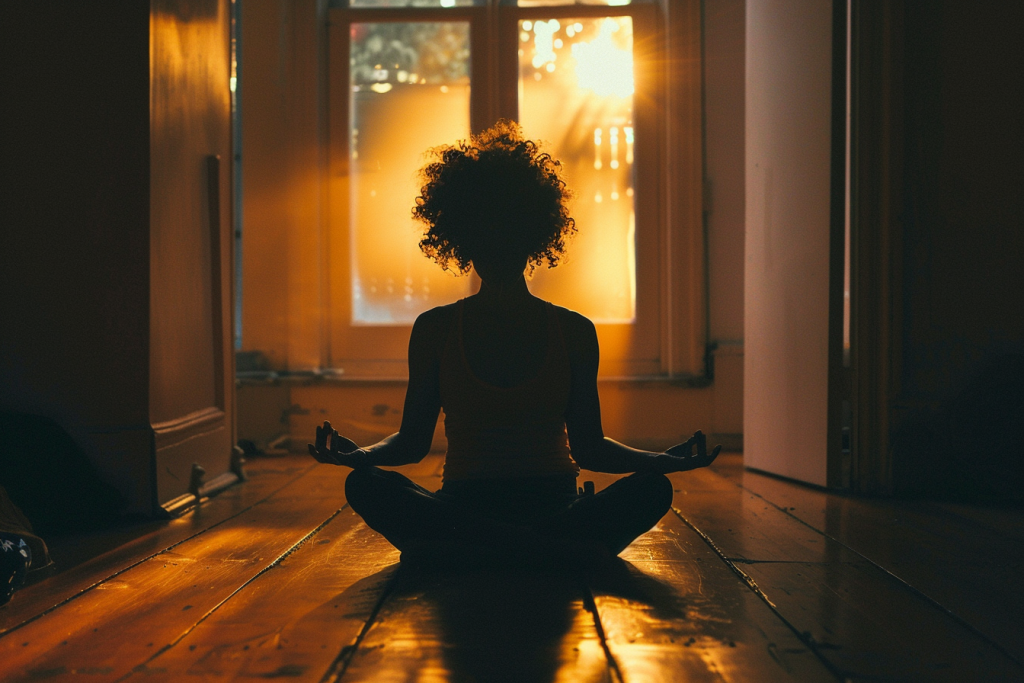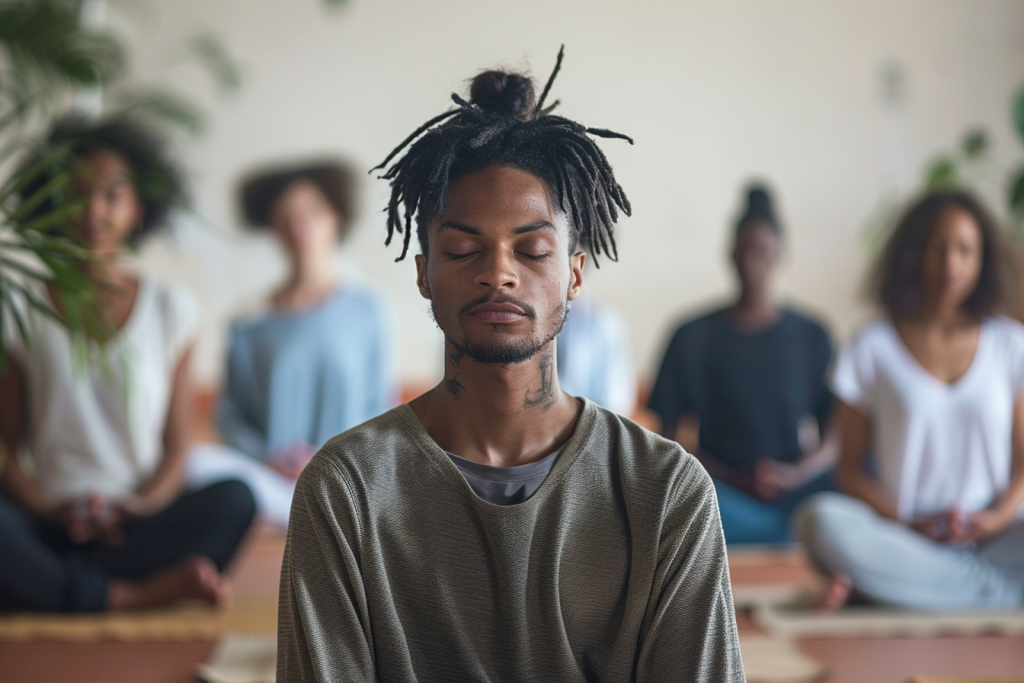Essence of Meditation and Mindfulness
What is Meditation and Mindfulness?
Exploring the Basics for Beginners
Diving straight into the world of meditation and mindfulness without any fluff, imagine meditation as your brain’s personal gym. No sweatbands required, though. It’s here where mental push-ups transform stress into serenity. And mindfulness? Well, that’s meditation’s cooler, laid-back cousin. It’s all about living in the moment, savoring the chocolate before it’s gone, and actually listening to your friend’s story rather than planning your dinner. Together, they’re like peanut butter and jelly for your mental health.
For those just starting, meditation techniques for beginners might include focused breathing or guided meditation resources, which are abundant online. The nugget of wisdom here is to start small. Even a few minutes a day can kickstart a transformation.
Visit the Mindful website for an array of guided meditation resources tailored for newcomers. It’s a treasure trove for anyone looking to dip their toes in the water.
The Interconnectedness of Mind, Body, and Breath
Understanding the Mind-Body Connection
Ever wonder why a deep breath feels so darn good? That’s the mind-body connection in action, powered by breathwork exercises. This connection underscores the importance of both meditation and mindfulness in maintaining mental equilibrium.
Breathing is like a remote control for the brain’s elevator, sometimes stuck between floors of anxiety and calm. Breathwork exercises not only help in hitting the correct button but also in ensuring the ride is smooth. They’re a cornerstone in practices like Mindfulness-based Stress Reduction (MBSR), highlighting their importance in exploring the choppy waters of modern life.
Meditation strengthens this connection further. By focusing on the breath, individuals can anchor themselves in the now, leading to benefits of daily meditation such as enhanced concentration and decreased stress levels. Whether it’s through mindfulness practices for anxiety or meditation for mental health, the essence lies in recognizing and harnessing this connection.
For those looking to explore MBSR and its offerings, the UMass Memorial Health Center for Mindfulness provides comprehensive information and programs. It’s a valuable resource for anyone aiming to understand and apply these practices in their life.
In essence, meditation and mindfulness forge a path toward a serene mind and a vibrant life. They invite a dialogue between mind and body, facilitated by the humble act of breathing. Through consistent practice, individuals can unlock the door to mental clarity and emotional resilience, proving that sometimes, the most profound transformations stem from simply being present.
The Comprehensive Benefits of Meditation and Mindfulness
Enhancing Mental Health Through Meditation
Tackling Anxiety and Stress with Mindfulness
In the overflowing cup of life’s stresses, mindfulness and meditation serve as the saucer catching the overflow. They’re not just trendy buzzwords but vital tools in the modern toolkit for mental sanity. Mindfulness-based stress reduction (MBSR) programs have shown a remarkable ability to reduce anxiety and stress, acting as a mental health umbrella on a rainy day. By anchoring the mind in the present, mindfulness practices for anxiety transform the chaotic noise of daily life into a manageable soundtrack. Here’s a kicker; meditation isn’t just for the Zen masters or yogis floating on clouds of enlightenment. With meditation techniques for beginners, anyone can start their journey towards mental clarity. It’s like learning to ride a bike, but instead of pedaling, you’re just breathing. Interested in getting started? The Mindfulness Training Programs bring the serenity of mindfulness right to your fingertips.
Physical Well-being and Meditation
The Role of Meditation in Physical Health
Let’s not forget, the mind and body are like peanut butter and jelly – better together, influencing each other in more ways than we can imagine. The mind-body connection through meditation and mindfulness reveals this relationship, promoting not just mental but also physical well-being. Those seemingly simple breathwork exercises? They’re like secret weapons against stress, capable of lowering blood pressure and improving heart health. Yes, just by breathing! We’re not making this up; science backs it up. Regular meditation practices can lead to benefits of daily meditation that extend beyond a calm mind to include a healthier body. Feeling skeptical? Consider how guided meditation resources provide an accessible path for everyone to tap into these benefits without needing to become a hermit in the Himalayas. To dive deeper into the transformative power of meditation on physical health, check out this resource on enhancing your life through daily meditation.
Meditation and mindfulness are no longer optional in our rapid world; they’re essential. By embracing meditation techniques for beginners and exploring mindfulness training programs, individuals can unlock the door to a healthier mind and body. The path to wellness begins with a single breath, leading to a myriad of benefits, from enhancing concentration through meditation to tapping into the profound mind-body connection. And with a plethora of guided meditation resources at our disposal, there’s no excuse not to give it a try. After all, if we can spend hours scrolling through social media, surely we can spare a few minutes a day to just… breathe.
Starting Your Meditation and Mindfulness Journey
Embarking on your meditation and mindfulness journey can feel a bit like trying to untangle your earbuds: overwhelming at first, but oh-so-satisfying once you get the hang of it. Let’s jump into some beginner-friendly techniques and practical tips to weave mindfulness and meditation into the fabric of your daily life without it feeling like just another item on your to-do list.
Beginner-Friendly Meditation Techniques
Simple Steps to Kickstart Your Practice
Starting with meditation techniques for beginners doesn’t have to be daunting. Imagine you’re learning to ride a bike, but instead of potential bruises, you’re on the path to serenity. First, find a quiet spot where you won’t be disturbed—consider it your personal zen den. Begin with just five minutes a day; you can increase the time as you become more comfortable. Focus on your breath, feeling the air enter and leave your body. It’s normal for your mind to wander—when it does, gently steer it back to your breath, no self-judgment needed. For guided support, look into guided meditation resources which can be incredibly helpful in directing your focus and enhancing concentration through meditation.
Meditation has been shown to bolster mental health significantly. One technique, Mindfulness-Based Stress Reduction (MBSR), is a powerful way to reduce anxiety and stress, proving that taking a moment to breathe can indeed transform your mindset. For those wanting more structured guidance, mindfulness training programs offer comprehensive insights into mastering the art of meditation.
Incorporating Mindfulness into Daily Life
Practical Tips for Busy Individuals
Integrating mindfulness practices for anxiety into your day might seem like adding another chore, but it can be as seamless as brushing your teeth. Start with mindful breathing; take a few moments to breathe deeply and center yourself before jumping out of bed. Turn routine activities into mindfulness exercises—when you shower, notice the scent of your soap, the warmth of the water, and how it feels as it runs down your back. Before responding to emails, take a breath and ground yourself. It’s about finding pockets of peace amidst the chaos.
The mind-body connection is real and incredibly influential in how we experience stress and wellness. Simple breathwork exercises can lower your heart rate and blood pressure, offering a quick and efficient way to manage stress on the go. Meanwhile, the benefits of daily meditation extend beyond the cushion; they infiltrate every aspect of life, enhancing your overall mental and physical well-being.
For those looking to dig deeper, websites like Mindful.org and the American Mindfulness Research Association offer a treasure trove of resources, from articles on the neuroscience behind mindfulness to directories of MBSR programs across the globe.
Embarking on this journey might feel a bit like stepping into the unknown, but with a sprinkle of patience and a dash of persistence, the path to mindfulness can be both enlightening and immensely rewarding. Remember, the ultimate goal isn’t to empty your mind or achieve perfection; it’s about fostering an awareness and acceptance of the present moment, allowing yourself to experience life more fully.
Deepening Your Practice
As you get comfy with the basics of meditation, it’s time to level up. This isn’t about turning into a Zen monk overnight but about exploring new avenues that can deepen your meditation and mindfulness journey. Let’s jump into some advanced techniques and structured programs that could be your ticket to an even more serene state of mind.
Advanced Meditation Techniques for Experienced Practitioners
Elevating Your Mindfulness Journey
For folks who’ve gotten their feet wet in the meditation pool, there’s a whole ocean of techniques waiting. Enhancing concentration through meditation becomes the next frontier. Techniques like “focused-attention meditation” require you to zero in on a single point (think: a candle flame or even your own breath) for extended periods. This isn’t just mental gymnastics; it’s about strengthening the mind-body connection, becoming more present, and yup, maybe even achieving those fleeting moments of enlightenment.
But let’s get real: this can feel a bit like leveling up in a video game, where the challenges get tougher but the rewards are worth it. These practices can significantly boost your mental stamina and bring a sharper focus to your daily life. And while guided meditation resources abound online, sometimes tackling these advanced techniques solo can feel a bit like trying to learn quantum physics from a cereal box. So, if you’re keen, seeking out advanced mindfulness training programs might just be your next move.
Mindfulness-Based Stress Reduction (MBSR) Programs
Structured Paths to Stress Management
Speaking of structured programs, let’s chat about the big kahuna: Mindfulness-based stress reduction (MBSR). Originally crafted in the crucible of clinical psychology, MBSR programs are all about using mindfulness to tackle the big, hairy monster of stress. And let’s face it, in today’s world, who isn’t doing battle with that beast?
MBSR is a structured, 8-week program that’s been shown to reduce not just stress, but also anxiety, depression, and pain. Yes, you read that right. This isn’t just about feeling a bit more chill; it’s about tangible improvements in mental health and well-being. It leverages a mix of mindfulness practices for anxiety, breathwork exercises, and even daily meditation to help participants develop a toolkit for managing stress.
What’s cool about MBSR is that it’s not just woo-woo theory; it’s backed by a solid body of research. Participants have reported everything from improved mind-body connection to reduced symptoms of chronic illnesses. Plus, in the age of the internet, finding an MBSR program has never been easier. Organizations like the American Mindfulness Research Association offer resources and links to certified programs.
So, whether you’re a meditation newbie looking to graduate from meditation techniques for beginners or a seasoned practitioner eager to explore new depth, there’s a path forward. And remember, the journey to deeper mindfulness and reduced stress doesn’t have to be solitary. Whether through advanced personal practice or structured programs like MBSR, the key is to keep exploring, keep practicing, and keep reaping those benefits of daily meditation.

Tools and Resources for Meditation and Mindfulness
In the ever-buzzing world we live in, carving out a slice of zen can seem like a Herculean task. Fear not! The journey into meditation and mindfulness isn’t a solo trek but a path strewn with tools and resources designed to guide each step with purpose and clarity. Let’s jump into the treasure trove of guided meditation resources and mindfulness training programs, ensuring you don’t just dip your toes but plunge headfirst into the tranquil waters of mindful living.
Exploring Through Guided Meditation Resources
Finding Guidance That Suits You
Venturing into guided meditation can feel like scrolling through a never-ending Netflix catalogue — overwhelming yet exciting. The key is finding guidance that resonates with your vibe and goals. Whether you’re longing to master meditation techniques for beginners or aiming to deepen your practice, an array of digital sanctuaries awaits. From YouTube channels dedicated to mind-body connection and breathwork exercises to apps that serve up daily doses of zen, tailored guidance is at your fingertips. Dabble in a few, mix and match styles, and you’ll soon discover the voice that lulls you into serenity. Don’t just settle; explore until you find your meditation match.
Selecting the Right Mindfulness Training Program
Tailoring Your Learning Experience
Choosing the right mindfulness training program is akin to selecting the perfect pair of jeans; it’s all about the fit. If you’re a novice, the Mindfulness-Based Stress Reduction (MBSR) program could be your holy grail. Renowned for its effectiveness in dialing down stress and anchoring the present moment, MBSR is a beacon for those seeking structured guidance. For a deeper dive, explore programs focusing on enhancing concentration through meditation or tackling specific concerns like mindfulness practices for anxiety. Sites like Mindful have a cornucopia of resources, guiding you to programs that align with your aspirations and lifestyle. Remember, the perfect program is one that sparks joy and fits into your daily routine, not adding to the clutter of chores.
The pursuit of mindfulness and meditation is a journey, not a destination. Armed with the right tools and resources, each step forward is a stride toward a more centered, peaceful, and mindful existence. With guided meditation resources and mindfulness training programs, the path is illuminated, inviting a fuller, richer experience of the moment. Embrace the exploration, for within it lies the essence of mindful living.
Meditation and Mindfulness in Everyday Life
Achieving Focus and Concentration Through Mindfulness
Exercises to Enhance Attention
Let’s face it, in today’s world, the gold medal for mental gymnastics goes to anyone who can focus for more than five minutes without checking their phone. Achieving Zen-like concentration seems like a task for the superhuman. Yet, enhancing concentration through meditation isn’t as mystical as it sounds. Simple mindfulness practices can help anchor you in the present, turning your attention into a superpower.
First off, meditation techniques for beginners can kickstart this journey towards sharpening focus. A popular method involves mindfulness-based stress reduction (MBSR), a program that cultivates attention and awareness. It’s like weight training for your brain; practice and persistence pay off. For more detailed insights, the National Institutes of Health offers a treasure trove of information on the subject.
Incorporating mindfulness practices into daily activities ramps up your focus game. Whether it’s feeling the weight of your feet on the ground while walking or savoring the flavor of your morning coffee—each moment is an opportunity for practice. These snippets of mindfulness train the brain to maintain attention, building a robust mind-body connection.
Breathwork Exercises for Relaxation and Clarity
Breathing Techniques to Calm the Mind
Onto the secret sauce of mindfulness: breathwork exercises. Imagine being able to hit the mental brakes and skid into a state of calmness at will. That’s what breathwork can do for you, serving as an on-demand chill pill. These breathwork exercises are not just hot air; they are potent tools for managing stress, anxiety, and even enhancing mental clarity.
One technique that stands out is the 4-7-8 method, a breathing ritual that acts as a natural tranquilizer for your nervous system. Here’s how it goes: breathe in through your nose for 4 seconds, hold that breath for 7 seconds, and whoosh it out through your mouth for 8 seconds. Repeat this cycle four times. Voila, you’re now officially cooler than a cucumber.
What’s magical about these practices, from mindfulness to breathwork, is their ability to forge a powerful mind-body connection. This synergy not only boosts mental health but also enhances the overall quality of life. For those diving deeper into the area of mindfulness, guided meditation resources and mindfulness training programs offer a structured path towards serenity and focus. Integrating these practices into your routine can significantly impact your mental well-being, providing a buffer against the stressors of modern life.
Remember, whether it’s through mindfulness practices for anxiety or meditation for mental health, the journey towards inner peace is a marathon, not a sprint. Each step forward, each breath taken with intention, is a stride towards a more mindful existence. So, why not start today?
Overcoming Challenges in Meditation
Embarking on a meditation journey can sometimes feel like trying to tame a wild, thought-filled beast with nothing but your breath. Let’s jump into turning those meditation oops moments into ah-ha moments.
Addressing Common Meditation Difficulties
Solutions for Staying Consistent
Consistency is the holy grail of meditation. Imagine hitting the gym once and expecting biceps like The Rock. Sounds goofy, right? Similarly, meditation is a workout for your brain that craves discipline. The trick is to weave it seamlessly into your routine. Whether you’re a morning bird or a night owl, slotting in meditation techniques for beginners before you roll out of bed or after you tuck in can kickstart a streak you’ll wanna keep. For those “but I don’t have time” moments, remember: daily meditation doesn’t demand hours. Even brief sessions can tighten that mind-body connection and, frankly, make life feel a tad less bonkers. Feel like you’re talking yourself out of it? Queue up some guided meditation resources on your phone. It’s like having a meditation coach whispering sweet, focus-enhancing nothings in your ear.
Using Mindfulness to Navigate Life’s Challenges
Real-life Applications of Mindfulness Practices
Mindfulness isn’t just for those serene, candle-lit moments. It’s for the “my latte just spilt in my lap” moments. Integrating mindfulness-based stress reduction (MBSR) tactics into the chaos of everyday life can transform how you ride life’s rollercoasters. Caught in a tailspin of deadlines? A few mindful breaths can be your invisible stress shield. Angst-ridden over an argument? Mindfulness practices for anxiety offer a step back, allowing emotion and reason to high-five each other harmoniously.
Real talk: life throws curveballs. Sprinkling a little mindfulness magic on situations, from gnarly traffic jams to nerve-wracking presentations, can seriously upgrade your coping game. For those keen to dive deeper, mindfulness training programs add extra ammo to your serenity arsenal, making you a zen-warrior in the face of life’s mini-dramas.
And let’s not forget the wellness duo of meditation and breathwork exercises. They’re like Batman and Robin for your mental health, offering a one-two punch against stress and jumbled thoughts. With consistent practice, the benefits seep beyond the cushion or yoga mat, spilling into the nooks and crannies of your daily grind. For further enlightenment, the National Center for Complementary and Integrative Health discusses the perks of integrating such practices into your routine for those hungry for more benefits of meditation for mental health.
Embarking on this journey, remember every meditator started as a beginner. Whether aiming for enhancing concentration through meditation or seeking a sanctuary from anxiety, the path teems with personal growth, mental resilience, and moments of unexpected joy. Keeping at it transforms meditation from a daily task to an eagerly anticipated rendezvous with your inner self.
The Future of Meditation and Mindfulness
Embracing meditation and mindfulness holds the key to revealing a world of enhanced mental well-being and resilience. As individuals navigate the complexities of modern life, integrating these practices into daily routines becomes not just beneficial but essential. The journey towards mindfulness is one of personal growth, offering moments of clarity and joy that might otherwise go unnoticed. By adopting meditation and breathwork exercises, people can significantly improve their focus and manage stress more effectively. The future of mental health and personal well-being is bright for those who choose to begin on this transformative journey. Let’s make meditation and mindfulness an integral part of our lives, fostering a healthier, more mindful society.
Frequently Asked Questions
What are the key benefits of integrating meditation into my daily routine?
Meditation improves focus, mental well-being, and helps manage stress. Regular practice leads to enhanced resilience, promoting personal growth and moments of joy.
How can meditation help in managing stress?
Meditation encourages a calm, peaceful state of mind, helping you cope with stress by focusing on relaxing thoughts or activities, which in turn benefits your emotional well-being.
Can meditation and mindfulness be practiced in everyday activities?
Yes, mindfulness can be practiced in daily activities by fully focusing on the task at hand, such as cooking or coloring, which can be forms of meditative practice without traditional meditation.
What are the main differences between mindfulness and meditation?
Mindfulness involves awareness of the present, focusing on the here and now without judgment. Meditation is a practice aimed at calming the mind through focused thoughts to achieve a state of peace.
Why is it important to practice mindfulness and meditation together?
Practicing mindfulness and meditation together enhances mental health and resilience. Mindfulness helps in staying present and aware, while meditation aids in achieving a peaceful state of mind, making them a powerful wellness duo.
How does mindfulness improve personal growth?
Mindfulness allows for personal growth by encouraging openness, letting go of fixed mindsets, and embracing the journey of life with empathy and trust, leading to unexpected moments of joy.
Our Latest Mindfulness and Meditation Posts
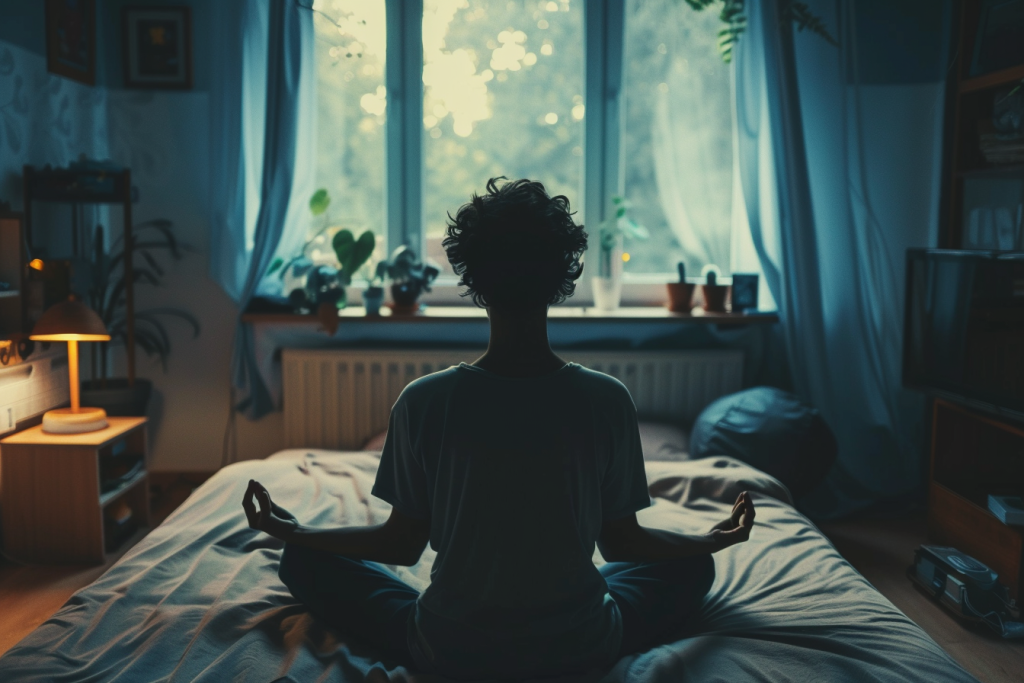
How to Master Guided Meditation Techniques for Beginners: Tips and Resources
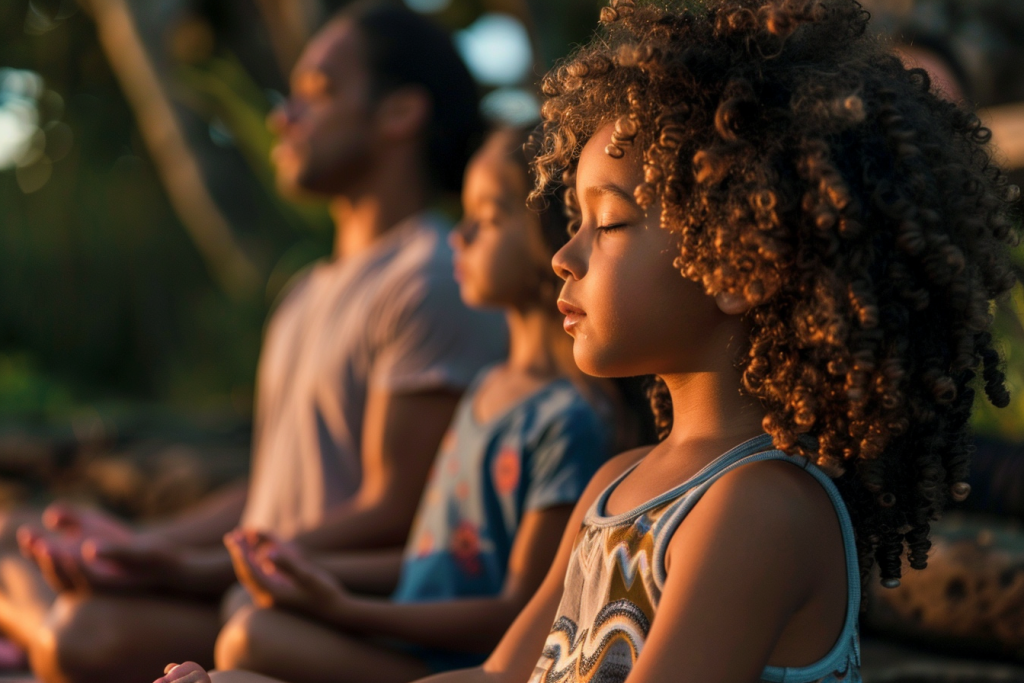
How to Meditate with Your Kids: Fun and Easy Practices for Families
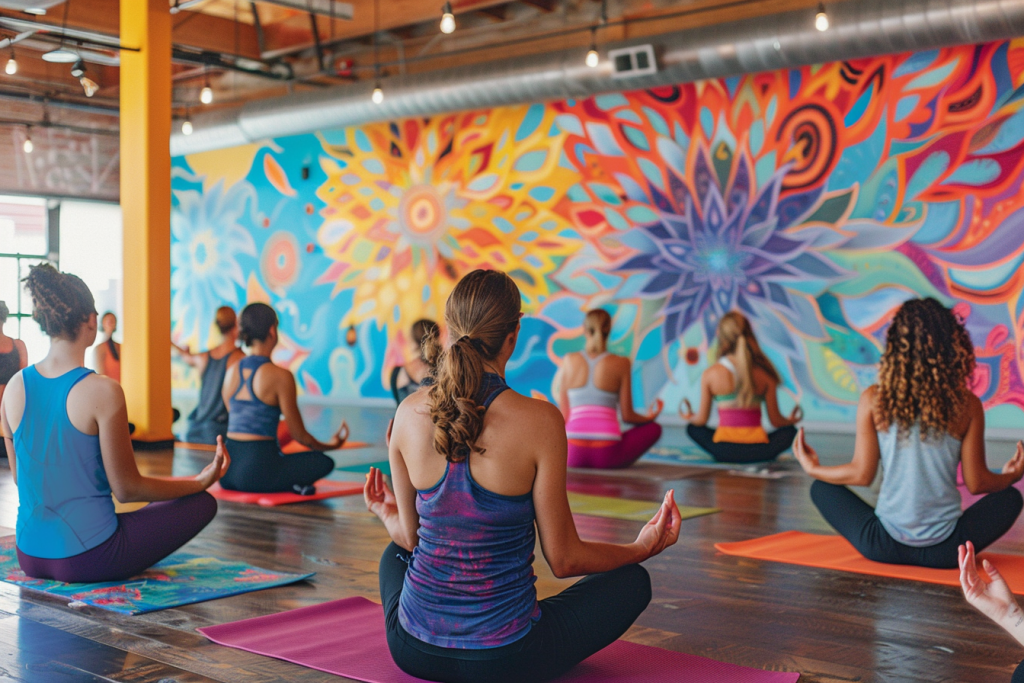
Discover Spiritual Enlightenment Through the Ancient Practice of Yoga

Understanding Zen Buddhism’s Approach to Mindfulness: Techniques and Benefits Explained
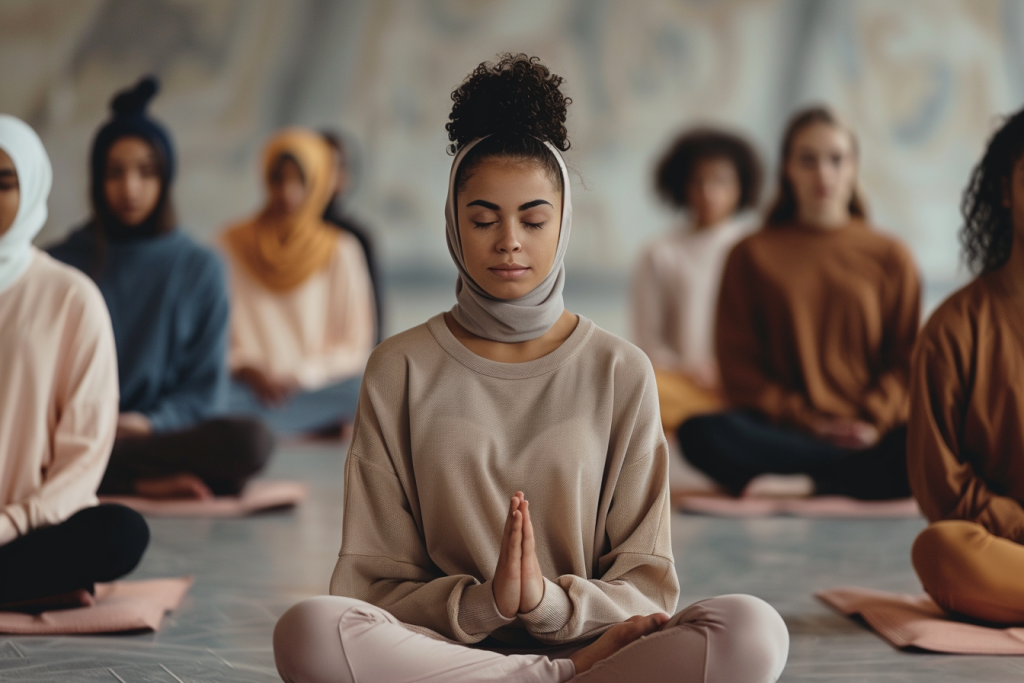
Discover the Psychological Benefits of Ancient Meditation Techniques – Reduce Stress & Enhance Focus
